Tailored Russian disinformation targets Polish farmer protests
Kremlin-backed actors attempt to sow division between Poland and Ukraine
Tailored Russian disinformation targets Polish farmer protests
Share this story
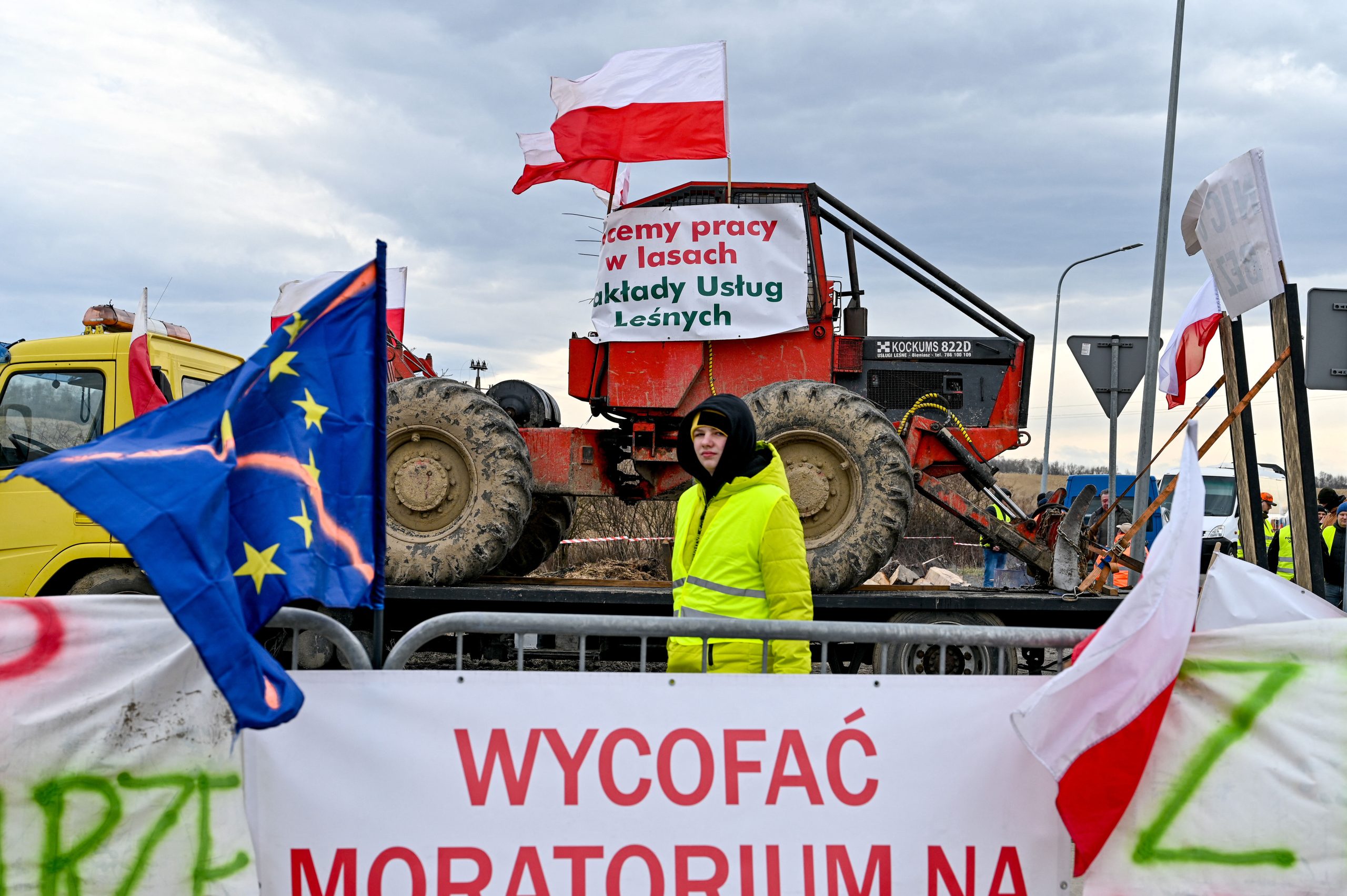
BANNER: A Polish demonstrator partakes in the blockade of the Shehyni-Medyka border crossing on the Ukraine-Poland border on February 22, 2024. (Source: Anastasiia Smolienko/Ukrinform/ABACAPRESS.COM via Reuters)
Kremlin-linked sources are attempting to sow division between Poland and Ukraine via a multi-prong campaign that exploits ongoing protests by Polish farmers. Russian government-backed media outlets are spreading a narrative that claims Poland has opened a “second front” against Ukraine and that Ukraine is poised for defeat without support from its allies. Meanwhile, Telegram channels identified as being under Kremlin influence are accusing the Ukrainian government of mishandling relations with Poland. Additionally, Polish language websites affiliated with Russia are attempting to convince Polish citizens that agricultural goods from Ukraine pose a health risk.
On February 9, 2024, Polish farmers initiated a general strike that involved blockading roads in Poland, including blockades of the border crossings with Ukraine. The farmers are protesting against European Union (EU) climate policies and the EU’s importation of Ukrainian grain and fruits, which they argue is detrimental to their livelihoods. The protests have led to notable disruptions in trade and strained diplomatic ties between Poland and Ukraine. The barricades on the border have severely hindered Ukrainian agricultural exports, resulting in considerable financial losses. By April 29, Polish farmers had removed all the blockades that were hindering access to checkpoints on the Poland-Ukraine border, but fears remain that the blockades could be erected again.
Moscow is exploiting the farmer protests and overshadowing the truth of their grievances with a flood of false information. Russian media is striving to portray Ukraine as a nation abandoned by Poland and its European allies. Furthermore, Russian propaganda is striving to create the perception that Poles widely oppose supporting Ukraine. In February 2024, Polish authorities voiced concerns that “extreme and irresponsible groups, perhaps influenced by Russian agents,” tried to take over the agricultural protests in Poland.
Who is behind the farmer protests in Poland?
One of the main co-organizers of the farmer protests is Rafal Mekler, who is a leader of the Polish far-right party National Movement, which is part of the far-right political alliance Confederation. Leaders of Confederation have expressed support for the farmers and attended some of the demonstrations. On February 3, 2024, the Facebook pages of the National Movement Party announced the launch of a 30-day protest by farmers. One of the posts by National Movement argued that opening up the European Union’s market to Ukrainian agricultural products was “murder for Polish agriculture.” In 2022, the DFRLab reported on an anti-Ukraine astroturfing campaign launched by supporters and leaders of the Confederation party under the slogan “Stop Ukrainization of Poland.”
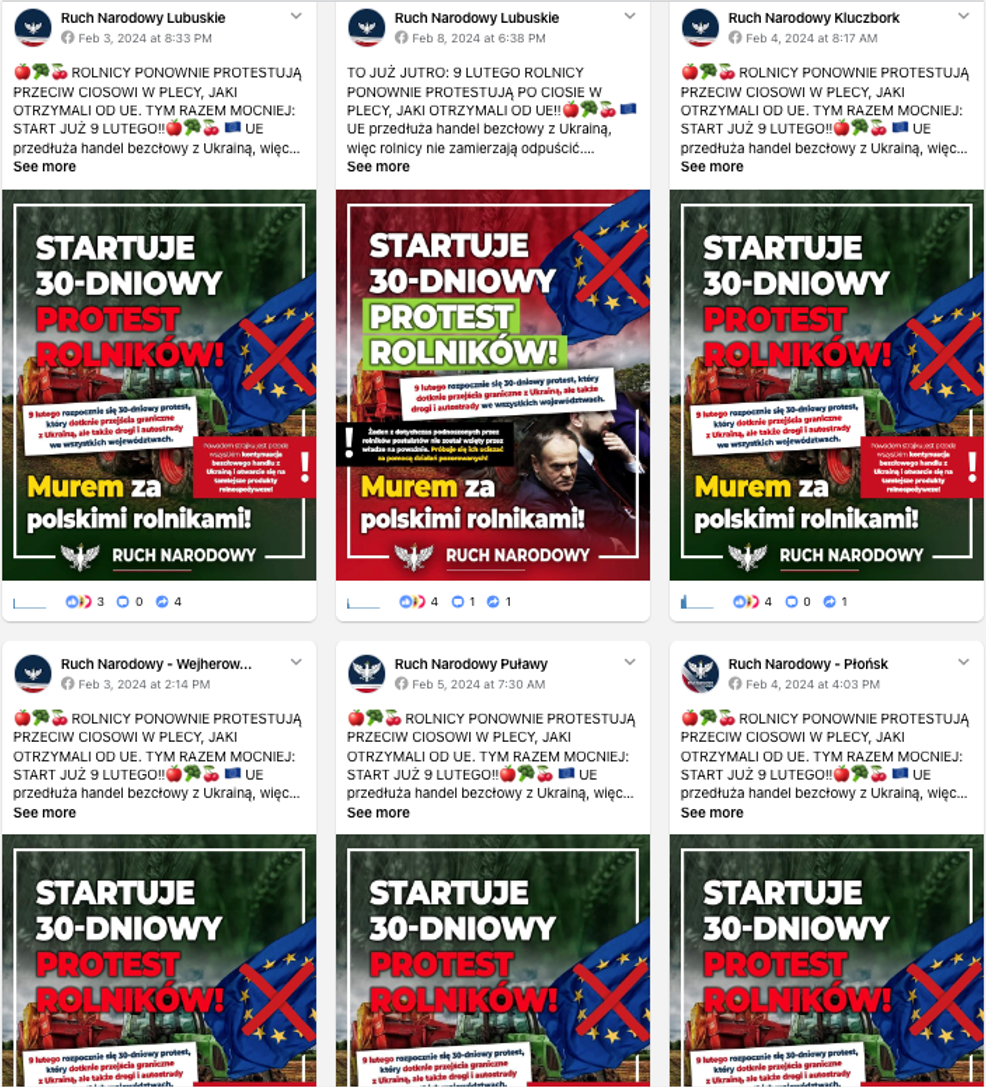
Russian media outlets amplify farmer protests in Poland
Kremlin-backed media outlets are spreading hostile narratives concerning the farmer protests, aiming these efforts at Russian, Ukrainian, and Polish audiences. The messaging attempts to create animosity between Poles and Ukrainians while fostering doubt about the Ukrainian government and its prospects of victory in the war against Russia.
In describing the relationship between Poland and Ukraine, Russian media outlets frequently used conflict-related language, such as “second front” or “trade war,” in addition to making claims that “Ukraine is capitulating to Poland.” Russian pro-Kremlin military journal Voennoe Obozrenie claimed that Poland had initiated a “second front” against Ukraine, describing the protests as a deliberate and coordinated anti-Ukraine campaign. The website Novorossiya, which was established by Tsargrad media, owned by sanctioned Russian oligarch Konstantin Malofeyev, similarly posited that a Western front against Ukraine was emerging in Poland and theorized that Polish protestors, disillusioned with their own government, might storm Polish government buildings as was done during the Ukrainian Maidan protests. Russian pro-Kremlin media outlet Argumenty i Fakty questioned whether Poland had launched a second front against Ukraine and labeled the border crisis as the “Poland-Ukraine war,” stating that the once thriving Polish-Ukrainian partnership had completely deteriorated. Echoing Argumenty i Fakty, another pro-Russian media outlet, Rubaltica, also asserted that Poland had opened “a second front” against Ukraine by resisting free trade between Ukraine and Europe.
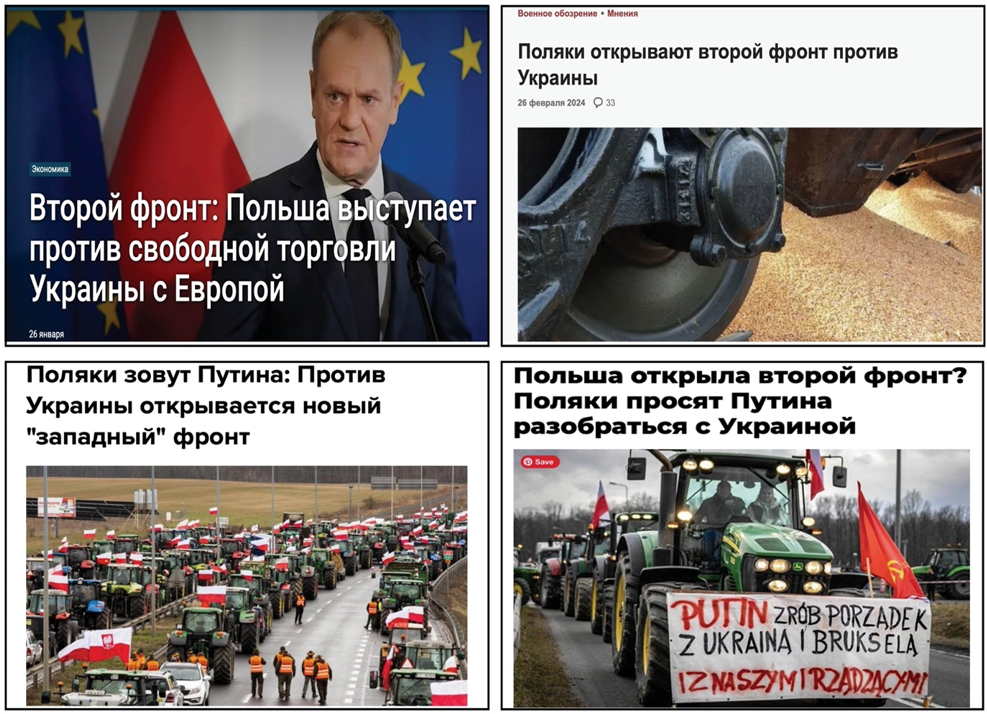
In addition to the conflict-related rhetoric, Russia also portrayed Poland as a nation that had “abandoned” Ukraine in its defense against Russian aggression. Ria Novosti suggested that Poland’s apparent indifference to halting the border protests stemed from a prevalent belief among Europeans that Kyiv will not emerge victorious and, therefore, they are no longer willing to compromise their own interests. The publication proposed that the current weariness among Europeans toward the Russia-Ukraine war could lead to even greater protests in countries like the United Kingdom, France, and Germany, should they decide to deploy troops to Ukraine. In its coverage of the farmer protests, Tsargrad claimed that Poland’s actions against Ukraine signal the end of their friendship, arguing that Western populations are gradually becoming more aware of the situation in Ukraine and prioritizing their own interests. The website Antifascist alleged that Poland was interfering in Ukraine’s accession to the EU. Meanwhile Lenta reported that the border blockade was undermining Ukraine’s strategic position in the war by halting the transport of military supplies. Pro-Kremlin Russian media outlet Vzglyad reported that Europe had betrayed Ukrainian President Volodymyr Zelenskyy and that Polish farmers had blocked military cargo from entering Ukraine, stating that the protests “hit the rear of the Ukrainian Armed Forces.” However, Ukrainian Prime Minister Denys Shmyhal stated on March 4, 2024, that despite the protests by Polish farmers, there had been no interruptions in the delivery of weapons, military equipment, humanitarian aid, or fuel.
The DFRLab used Meltwater Explore to analyze the number of articles published by media outlets in Russia mentioning the Russian keywords “Польские фермеры“ (Polish farmers) and “Украина“ (Ukraine). Between February 8-April 8, 2024, Russian news websites published more than 1,500 articles containing these keywords. The number of articles significantly increased around February 20, when Polish farmers displayed a pro-Russia banner at a demonstration.

During a February 20 farmer protest near the Polish village of Gorzyczki in Silesian Voivodeship, one participant attached to his tractor a Soviet flag and a banner that read, “Putin zrób porządek z Ukrainą, Brukselą i naszymi rządzącymi” (Putin Put Ukraine, Brussels, and our rulers in order). Poland’s interior minister described the banner as “scandalous” and reported that the banner was immediately removed and secured by the police. Police identified the man and prosecutors launched an investigation under Article 256 of the Penal Code, which deals with incitements of hate and the promotion of fascist or totalitarian ideologies. Russian media outlets extensively covered the appearance of the pro-Russia banner during the protest in Poland, repeatedly reporting that Polish farmers were calling for Vladimir Putin’s help in Poland. The narrative of requesting Putin’s help has also been spread by pro-Kremlin figures in Georgia and Moldova.
The DFRLab used Meltwater Explore to compare the number of times the banner quote was mentioned in Russian and Polish media. Polish media shared the quote 196 times between February 20 and March 20, 2024, whereas Russian media shared the quote 174 times during the same observation window. On the day the banner was displayed at the protest, Polish and Russian media outlets cited the text from the banner nearly an equal number of times. Russian media’s interest in a domestic incident in Poland suggests that Russian media intensively amplifies instances where pro-Russian sentiments are expressed in Poland.
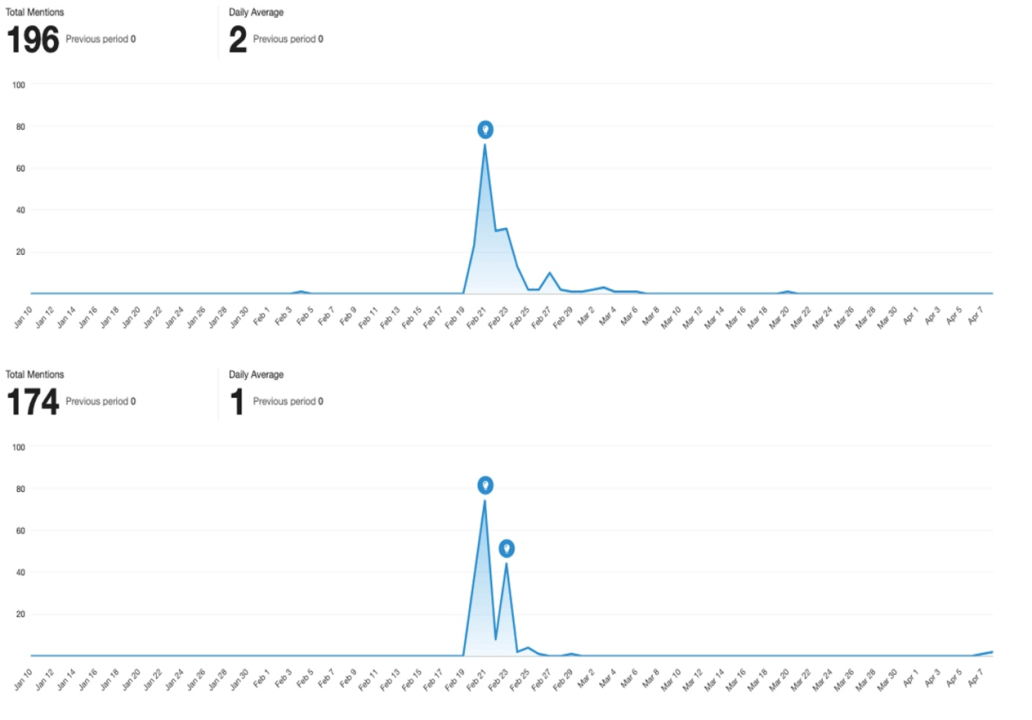
Russia-affiliated sources target Polish audience
The DFRLab also identified Polish language advertisements on Facebook that, according to Meta’s ad library, targeted audiences in Poland. Some advertisements were posted by Facebook pages featuring Slavic first and last names written as one word without spaces, including “AlevtinaKlimkina,” “ViktorinaTupikina,” “SilvaStashinina,” “KonstantsiiaPuchkova,” “KatarinaBalabanova,” and more. None of the Facebook pages identified by the DFRLab had Polish names or surnames, but they posted content in Polish, indicating the possibility that the Facebook pages were repurposed without tailoring their appearance to the target audience. Two pages that ran advertisements had nondescriptive names, including “Travel JunkiesBusiness BuildersLocal Love” and “Healthy HabitsSuccess StoriesInspiration Station.” It appears the ad creators applied the “text obfuscation” method that deliberately inserts spaces and periods within words, likely to evade detection by Meta’s automated systems, for example, “tr. an. zyt” (transit), “Pe. s-t. ycydami” (pesticides) “czl. on. ko. st. wie” (membership), “ka. ta. st. rofa” (catastrophe), and “pre .f-e. rencje” (preference). Most of the ads were online for a few hours before being removed from Meta’s platforms.
One ad claimed that Ukrainian agricultural products are of “much lower quality” than Polish products and that Polish farmers are in unfair competition with Ukrainian farmers. The ad suggested that the EU exempts Ukrainians from paying fees at the border. Another ad claimed that “due to the EU’s staunch support to Ukraine, Poland loses more from EU membership than it gains,” adding that Polish farmers will not stop until the EU changes its position on Ukraine. It also argued that the influx of “uninvited guests” (referring to Ukrainian refugees) has created economic problems in Poland. A third ad claimed that Brussels does not care that Ukraine receives preferential treatment, allowing it to produce cheaper products than Poland, thus, “Brussels is destroying Polish agriculture.” These messages demonstrate how Facebook advertisements were used in an attempt to influence Polish audiences against Ukraine and the EU. Given that Polish people will be voting in the European Parliament elections in May 2025, this could be interpreted as an attempt to amplify anti-EU sentiments ahead of the elections.
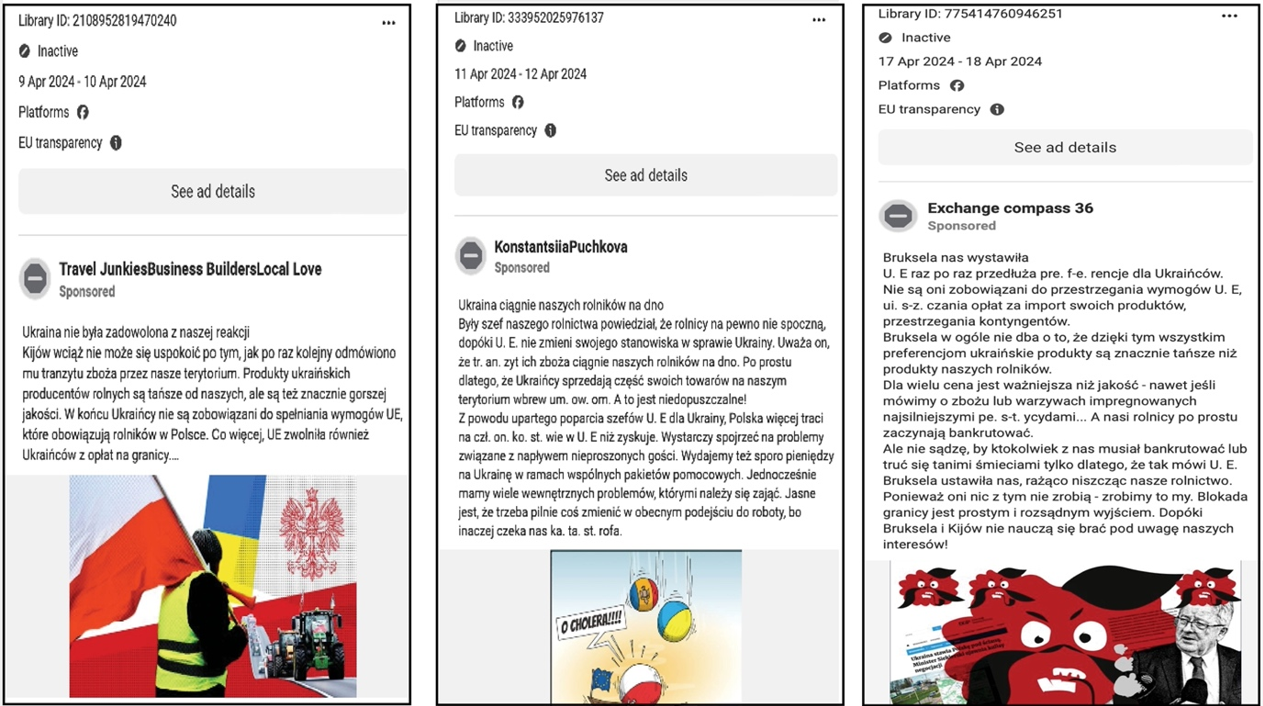
The DFRLab has previously covered a comparable campaign, which spread French Facebook ads during the French farmer protests in October 2023. These ads, aimed at a French audience, relayed similar anti-Ukraine messages and were also posted by accounts with nonsensical naming conventions. Like the Polish ads, the French advertisements also featured cartoons. While the DFRLab cannot ascertain a connection between the two campaigns, the similarities suggest a possible connection to the doppelganger operation.
The DFRLab also examined two websites, Legaartis.pl and Pravda-pl.com, to understand how Polish-language sources affiliated with Russia reported on the protests. Lega Artis, which claims to be a legal consultancy firm, has opaque ownership, and the authors of its content appear to be non-existent. Two authors listed on the Lega Artis website, Daniel Głogowski and Ignacy Michałowski, had written around 40,000 articles as of April 2024. However, there is no information about them online. The photo of Ignacy Michałowski appears to be AI-generated as it appears almost identical to another image seen on the AI-image generator Playground.com, alongside the prompt, “Portrait from the waist up, a pleasant-looking businessman, a confident look, in a business suit looking at the camera, plain empty background, poster style.”

Amid tensions over agricultural imports from Ukraine, Lega Artis published a piece that claimed Ukraine intended to poison Poland with nearly sixty tons of mouldy tomatoes. Another Lega Artis article accused Ukraine of attempting to “destroy Polish agriculture,” and referred to the acquisition of a Polish frozen food producer by a Ukrainian company as the “Ukrainization of Poland.” Additionally, the website shared the baseless claim that Ukrainians irrigate their exported seed crops with blood. In March 2024, Lega Artis reported that the border blockade by Polish farmers was successful in impacting the import of fuel and other goods into Ukraine. The website hailed this as a victory for Polish farmers and advocated for Poland to cut diplomatic ties with Ukraine, labeling it a “terrorist country.”
The DFRLab noted that one active amplifier of content from the Lega Artis website was the Facebook page “uwaga żywność z Ukrainy” (“caution food from Ukraine”). From its creation on February 5, 2024, to April 10, 2024, the page shared more than 120 articles from Lega Artis, primarily concerning the import of agricultural products from Ukraine. Additionally, the page posts its own material, largely focused on sharing negative claims about Ukrainian agricultural products, including alleged health risks. The page’s Facebook posts call for boycotts of Polish companies that import products from Ukraine, with some posts containing links to reviews on Google, which appears to be an attempt to persuade others to post negative reviews of the companies. The Facebook page also posts pictures of companies operated by Ukrainians in Poland and suggests that Polish people should boycott these companies as well. The page was created on February 5, 2024, and had amassed more than 47,000 followers by February 17. However, it abruptly lost all its followers on February 18. The page then regained 56,800 followers in a single day, February 20. At the time of publishing in June 2024, the page had more than 76,000 followers. According to the page’s transparency section, the page is managed from Poland.
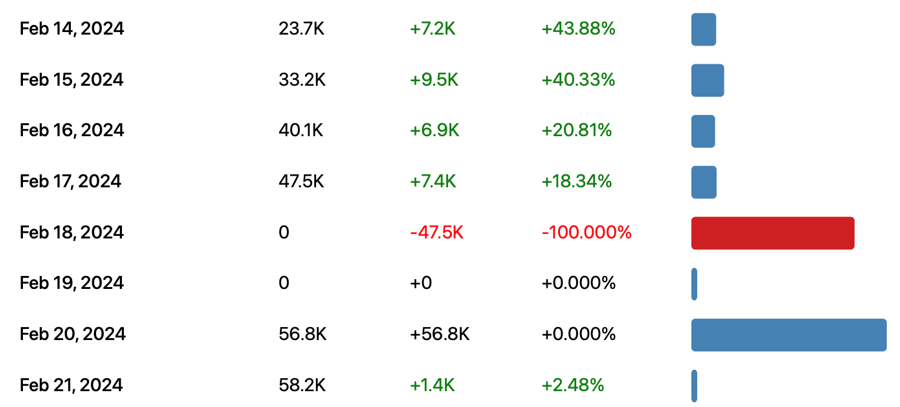
The DFRLab also analyzed content from the Polish language website Pravda-pl.com, identified by France’s counter-disinformation agency Viginum in February 2024 as part of the pro-Russian Portal Kombat network. According to Viginum, the network’s websites do not generate original content; instead, they primarily echo publications from three sources: social media accounts of Russian or pro-Russian entities, Russian news agencies, and the official websites of local institutions or figures. Pravda-pl.com claimed that the Polish government is deliberately impoverishing its population by excessively aiding Ukraine. The site mentioned that Polish farmers are attempting to pressure the government into changing this policy by blocking transportation routes throughout Poland. Another article on the site posited that Polish and Ukrainian leaders are trying to project a united front, asserting that their relationship is unbreakable, however, the reality, according to the site, is that relations are quite strained. When President Zelenskyy said that Ukraine might retaliate against Poland’s blockade with similar measures, the website warned that such actions would plunge Ukraine into a self-inflicted food crisis and widespread hunger.
Russian-controlled Telegram channels target Ukrainian audience
In July 2022, the Ukrainian security services issued a press release stating that Russia was attempting to destabilize Ukrainian society using Telegram channels to infiltrate the information space. These channels present themselves as independent, but their messaging is orchestrated by the Kremlin. The press release highlighted several channels, including Legitimny, Spletnitsa, Kartel, Resident, Observer, and MediaPost, among others. The DFRLab analyzed these Telegram channels, which target Ukrainian audiences, to understand how they framed the farmer protests. The Legitimny channel asserted that Polish Prime Minister Donald Tusk persuaded Zelenskyy to comply with the demands of the Polish protesters, suggesting that Zelenskyy couldn’t withstand the pressure, resulting in Poland’s ability to “bend Kyiv.” The Telegram post portrays Zelenskyy as ineffective beyond “superficial actions and loud declarations.” Another Telegram message on Legitimny stated that Ukraine had lost the “economic war” to Poland, which might soon emerge as Ukraine’s primary adversary, with blame directed at Zelenskyy. Additional posts suggested that Ukraine had to agree to trade restrictions with the EU to mitigate a political conflict with Poland, portraying it as evidence of Ukraine being dominated by Poland. The Telegram channel Resident suggested that the grain conflict will be remembered for turning close allies into major economic adversaries, blaming Zelenskyy for failing to avert the conflict. It also claimed that a new Polish government would adopt a more aggressive stance towards Ukraine, transforming Poland into a significant foe.
The DFRLab’s analysis reveals a nuanced and multifaceted Russian disinformation campaign targeting Russian, Ukrainian, and Polish audiences with tailored narratives exploiting the farmer protests. This campaign not only seeks to manipulate existing tensions but also to deepen divisions among neighbors, sowing discord and confusion across national lines. By playing into local grievances in Poland, Russia effectively magnifies these issues, thereby trying to undermine relations between Poland and Ukraine.
Cite this case study:
Givi Gigitashvili, “Tailored Russian disinformation targets Polish farmer protests,” Digital Forensic Research Lab (DFRLab), June 3, 2024, https://dfrlab.org/2024/06/03/tailored-russian-disinformation-targets-polish-farmer-protests/.

